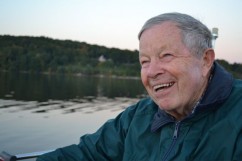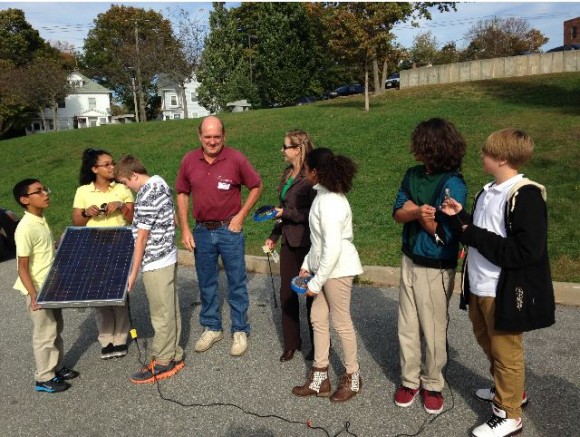
Old Lyme resident Richard Shriver formed the Mentoring Corps for Community Development (MCCD) in June 2012 with an ambitious purpose in mind: he wanted to harness the experience of retirees who had been successful in their careers to give back to the community through free advice and consultations.
After writing a paper on the subject of retired people doing something to give back to their communities, Shriver met with three different individuals, each of them friends of his who did not know each other, but who had expressed an interest in this very idea. “I had three strangers who didn’t know each other, and I thought I would bring them together, have coffee, and see what happens. For that to grow into something useful is unlikely, but luckily for us, it did, and I think it’s a good thing for any community to have.”
A group of what has now grown to 12 MCCD board members has convened every Friday morning since its founding to meet with people and organizations about a variety of problems; MCCD’s work is all volunteer with no fees paid by the beneficiaries. The group’s areas of focus include humanitarian aid to those who have an illness or are in need; helping those with economic issues; assisting people with career changes; aiding companies, start-ups, and businesses that either want to expand or are in economic trouble; and mentoring students from 5th grade through high school.

As for how they actually help, Shriver summed it up by saying, “After the first contact is made by the person in need, we listen, and we react.” The process begins with an initial meeting where two members of the MCCD meet with the person(s) seeking help. Businesses send their business concepts in writing and may then be invited to a brainstorming session where seven or eight members of the MCCD critique the plan based on practicality, political soundness, administrative efficiency, and economic justification.
Shriver commented, “We discovered the power of brainstorming,” adding, “Things come out that nobody would expect. This is one of the most powerful services we offer. Someone comes in with a plan, and we apply our 300 years plus of combined experience.”
Although the experience of MCCD members is diverse, occasionally people come to them with problems with which they are unfamiliar. When this happens, the MCCD looks for people to bring in to help. “It’s amazing what we find,” said Mr. Shriver. “People never say no to helping if they have time.”
Rather than offering to go out and raise money, the MCCD helps people to develop the tools to accomplish that for themselves. One of their major success stories occurred soon after the MCCD was founded in the fall of 2012. A single mother of three children still in school was struggling after Superstorm Sandy, and the entire group worked tirelessly on the problem for months to help her obtain aid from various sources including FEMA. She now volunteers with MCCD when she has the time.

The MCCD currently has about 30 projects, including a STEM (Science, Technology, Engineering and Math) program for the New London school system, with the goal being not specifically to educate, but rather to inspire students to take and excel in STEM classes in high school. ”I like to see people succeed, whether they are 8 or 80,” said Shriver. “That’s certainly my motivation. If they succeed through one conversation, that’s great; if I worry they won’t succeed, then I get passionate. I do my best to help them get on the right track.”

Carina Using is the director of the Old Saybrook High School Internship Program that has placed over 300 interns at different job sites throughout the area for a combined total of 50,000 hours working in the community. She explained how the MCCD was a invaluable asset to her. “More than anything else, having them as a resource to help find internship sites, mentorship for students, and even advice for me on how to run things is incredibly valuable.”
She continued, “Without the support from our community and the amazing businesses that take our interns, as well as organizations such as the MCCD, our internship program wouldn’t be possible. The commitment of community businesses and organizations is absolutely vital to the success of this program and really shows how they are investing in our students’ futures.”
Shriver said, “We like to help people at a crossroads. We’re interested in high school and college internships because it’s an underserved area to help young people find careers. We are eager to help kids choose the right education, as well as provide inspiration to get the education.”
When asked if he had anything he’d like to say to people in the community, who might be considering contacting the MCCD for help, Shriver responded, ”Just give us a call, it’s as easy as that. Nobody should feel awkward or uncomfortable about needing help, Everything is private and confidential. Just go to mentoringcorps.org where there is contact information for getting in touch with us. It never hurts to have an initial discussion, tell us what you need, and see if the relationship works. We don’t say no to anybody about anything until that first discussion.”
On behalf of the Lymes’ Senior Center Board of Director’s, I would like to publically thank MCCD, and specifically Dick Shriver and BJ Bernblum, for their support and direction in helping us attain our Non-profit 501 (C) 3 status: ‘Friends of the Lymes’ Senior Center, Inc.’ Tax deductable donations can now be accepted by the ‘Friends’ group, we are eligible for matching funds grants and are able to apply for state and federal grants. All monies received are used for program development relative to providing recreational, social, educational and area resources for senior citizens in the towns of Lyme and Old Lyme.
If you would like to make a donation and/or volunteer at the Center, please contact me via email.
Diane